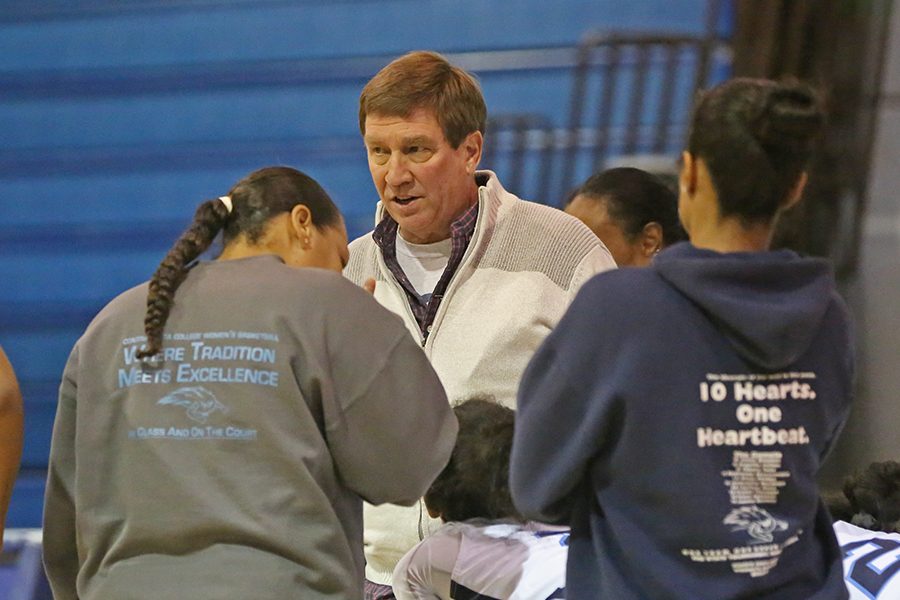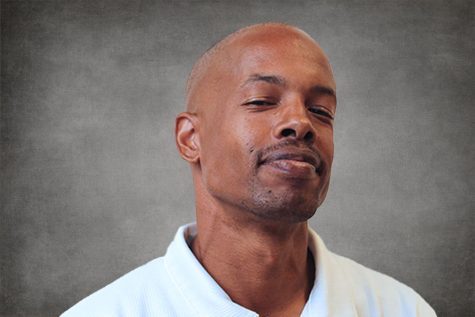‘Passionate’ coach shifts focus, drive
Basketball sage closes playbook, adjusts vision
Former women’s basketball coach Paul DeBolt talks to his player and assistant coach during a Comet practice session in the Gymnasium on Dec. 15. 2015.
May 18, 2016
When people speak of someone being “a lifer,” most thoughts turn to a person who made bad choices in life or committed some heartless act. We imagine someone forgotten to the world or someone wasting away in a lonely abyss.
Paul DeBolt is just that — a lifer. He served as Comet women’s basketball coach since its reinstatement in 1986 until announcing his retirement from the team following the 2016 season. He will continue teaching journalism and advising The Advocate, a job he began in the fall of 1980.
“I always knew I wanted to coach basketball. It was something I was going to do all the way through my career, if possible. The only way I wasn’t going to coach is if I had a job in journalism that wouldn’t allow me to,” DeBolt said. “That’s what makes my jobs (teaching journalism and coaching basketball) at CCC so special. But one of them had to go because I never planned on doing both of them until I retire from the college.
“It just made sense to (step down from coaching) now.”
This year’s Comet squad added to the lore of the DeBolt legacy, boasting a 21-10 overall record. The team won the Bay Valley Conference championship, making his coaching win-loss record 562-380, placing him at sixth all-time in the state in overall coaching wins.
DeBolt, 61, was also named Coach of the Year in the BVC for the eighth time in his career.
Aside from those accolades, the coach was named the Women’s Basketball Coaches Association District 8 JC Coach of the Year three times for the years 2000, 2001 and 2003. DeBolt was also named the California Community College Women’s Basketball Association Coach of the Year in 2001 after coaching the Comets to the State Championship Game that season.
Under his leadership, the Comets won the BVC 11 times and finished in second or third place a staggering 10 times on top of that. CCC played in four Elite Eights, three Final Fours and two State Championship Games.
His women’s basketball teams in 2001 and 2003 are the only teams in the history of the college, besides the 1954 and 1955 baseball teams, to play in a State Championship Game.
Basketball has always been in DeBolt’s blood. As an 8-year-old, the El Sobrante youth primed his palette for a future in the sport after falling in love with the game while a member of the El Sobrante Boy’s Club.
He went on to play at De Anza High School and graduated in 1972. Then he ventured a short hop down the road to CCC where he played for legendary men’s basketball coach Ed Greene, before graduating with his associate degree in liberal arts in 1975.
Greene said, “I went over and talked to his coach at De Anza (Neil Harriman) who was my coach too. He told me he had two players and one of them was DeBolt,” Greene said. “Coming from El Sobrante, our team make up was a new experience for him. But it did not take him long to adjust.”
In his second season as a Comet, on what was considered a weaker Comet team, DeBolt’s Comet squad won 18 games and made it to the playoffs.
Following his days as a Comet, DeBolt transferred to San Diego State University where he played as a walk-on for the Aztecs before receiving his bachelor’s degree in journalism in 1977 and his master’s in mass communication in 1980.
DeBolt returned to the Bay Area that summer and was hired as CCC’s journalism department chairperson. He also served a stint as the girls’ basketball coach at Pinole Valley High for three years from 1983-86, before resigning from that position.
Of DeBolt’s hire as journalism prof, Greene said, “The college wanted to hire the publicity rep from the College of the Sequoias in Visalia. He had all of the credentials and a top-notch reputation. He moved to Richmond on July 1 and by July 18 he was already headed back — I don’t think they stayed long enough to unpack their furniture.”
In 1980, at 25 years old, DeBolt had impressed the hiring committee enough to take a second look at him. He was hired, and a few years later, in 1986, began his journey as the women’s basketball coach for the Comets.
“The athletic director at the time, Paul Farris, called me to his office and asked if I wanted to start a women’s basketball team at the college and, without talking to anyone, I said ‘yes’,” DeBolt said. “I had to go home and tell my wife that I was going to coach again. She told me to make sure I got paid for it.”
His impact with the Comets was apparent, almost from the start. After finishing in eighth place in his first season, his Comet squad bounced back to capture consecutive BVC titles in the 1987-88 and 1988-89 seasons.
“That second year I remember having other coaches tell me, ‘You guys are good,’ or ask me ‘How’d you get good so fast?’” DeBolt said. “I remember looking at those talented players after big games and being like, we did it. We’ve arrived. Now let’s go play everybody.”
From there the coach continued to forge the foundation of his career right up until the biggest test he would face during his coaching tenure.
On Nov. 17, 2011, Vallejo Police Officer Jim Capoot, a coaching mentee, a life mentor and close friend of DeBolt and his family, was killed in the line of duty. His daughter Jamie was a Comet guard at the time.
“I don’t think I ever recovered from that as a coach,” DeBolt said. “It made basketball seem so insignificant. We’re so close to the family. I still can’t put it into words. For some reason I could never be as demanding of my players after we lost Jim.”
With 36 years on campus and counting, few of his current colleagues have been here long enough to witness the complete evolution of the professor and coach.
But one has.
“Paul is passionate. He takes his students seriously. He’s not saying, hey, I have a couple of hours to kill. He loves basketball. He loves journalism. He’s the real deal,” fine and media arts professor John Diestler said. “He did a heartless act (by stepping down from coaching) because it really was taking his heart out.
“But it was time.”




Paul DeBolt • Jan 30, 2019 at 10:49 pm
Thank you for those kind words Resie. They mean so much! You were there from Day 1! I would love to catch up with you. My email is [email protected]. I hope they put this up and that you see it. You were such a great young person and basketball player. I’m still teaching journalism at the college in the same classroom. Hope to hear from you. -Paul
Resie Kelly • Jan 16, 2019 at 8:36 pm
I was the point guard on the first CCC women’s basketball team in 1986. Some of the players were athletes, and other’s just wanted to play. We even had a girl named Sue that only spoke Spanish on our team. Maaan could she handle that ball!!! Couch DeBolt was a great couch because he got to know all of our individual skills and personalities. He put everything he had in us, and he expected our team to do the same. Our record was low in 1986. But the next year we were among the best Women’s basketball teams in Northern California. And has been ever since
Now what does that tell you?